Introduction
Navigating the complexities of Autism Spectrum Disorder (ASD) can be challenging for any parent or caregiver. Understanding this multifaceted neurodevelopmental condition is crucial in recognizing the unique needs of children affected by it. This article delves into the intricacies of ASD, highlighting the importance of early recognition and the various treatment options available, including medication.
By examining the role of medication and its efficacy, the article provides a comprehensive guide to managing ASD symptoms. It also explores FDA-approved medications, their potential side effects, and other therapeutic options like melatonin for sleep disturbances. Additionally, the article addresses the challenges in medication management and underscores the importance of collaboration with healthcare providers.
Looking ahead, it sheds light on the promising future of ASD treatment through precision medicine and emerging therapies, offering hope for more personalized and effective care.
Understanding Autism Spectrum Disorder (ASD)
Autism Spectrum Disorder (ASD) is a multifaceted neurodevelopmental condition, marked by a wide range of symptoms such as difficulties in social interactions, communication challenges, and repetitive behaviors. Identifying ASD is crucial, as it enables parents and caregivers to recognize the specific requirements of their offspring and investigate different therapy alternatives, including pharmaceuticals. The latest guidelines from the Council of Autism Service Providers (CASP) emphasize the importance of correctly implementing Applied Behavior Analysis (ABA) to achieve high-quality treatment outcomes. This underscores the need for informed decisions when considering treatment options. Moreover, initiatives such as those by The Autism Community in Action (TACA) provide valuable insights into medical research, treatment methodologies, and therapies designed for individuals on the spectrum.
The Role of Medication in Managing ASD Symptoms
Medication can significantly aid in managing the symptoms associated with Autism Spectrum Disorder (ASD). 'While it is not a remedy, certain treatments can ease behavioral challenges, anxiety, and irritability, thereby allowing young individuals to engage more fully in their daily activities. For instance, research published in the journal Psychopharmacology highlights the ongoing efforts in neurology to discover new treatment options for individuals with developmental disorders.
Grasping how drugs fit into a complete treatment strategy is crucial for caregivers striving to aid their offspring's growth. As stated by the Interagency Autism Coordinating Committee (IACC), which works with diverse partners, including parents and experts, a comprehensive method to care for individuals with developmental disorders is essential. This approach often merges pharmaceutical treatments with other interventions such as behavioral therapy, ensuring that each child's unique needs are met.
Statistics from the Centers for Disease Control and Prevention (CDC) indicate that public health data is increasingly utilized to analyze the effectiveness of various treatments for developmental disorders. These insights help in tailoring interventions to individual needs, reinforcing the importance of a personalized healthcare plan.
Furthermore, the Federal Drug Administration (FDA) guarantees that all treatments prescribed for developmental disorders undergo thorough testing to confirm their safety and efficacy. This regulatory oversight offers guardians the assurance that the treatments their offspring receive are both safe and advantageous.
Including pharmaceuticals in a more comprehensive treatment strategy, thus, not only assists in managing symptoms but also improves the overall quality of life for youngsters with autism. By staying informed and working closely with healthcare providers, parents can make well-informed decisions that best support their child's development.
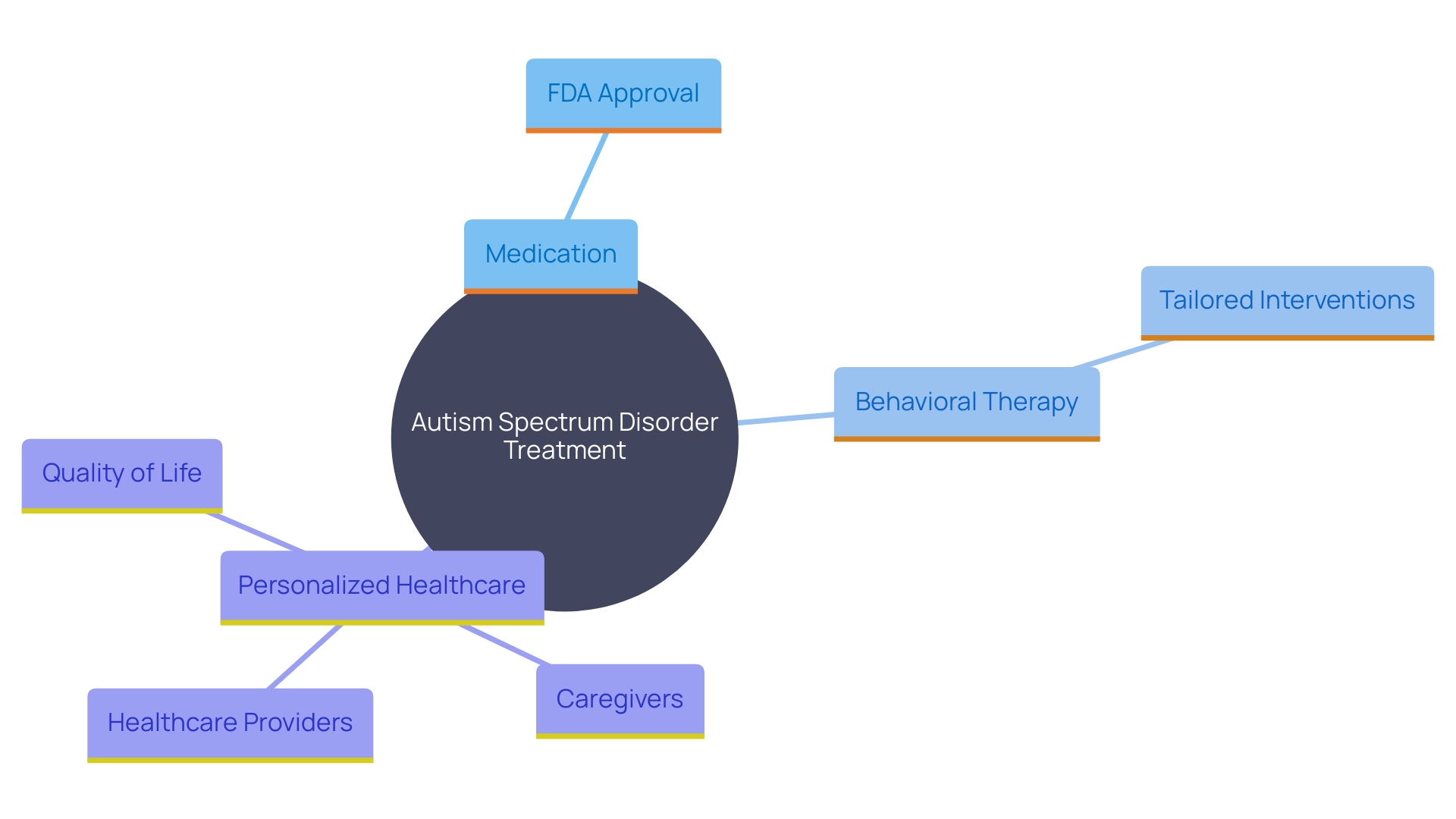
FDA-Approved Medications for ASD
The FDA has authorized several treatments specifically for managing symptoms related to Autism Spectrum Disorder (ASD). Notably, atypical antipsychotics such as risperidone and aripiprazole have demonstrated effectiveness in reducing irritability and aggression. The FDA's rigorous approval process, which relies on comprehensive scientific evaluation and testing, ensures that these medications are safe and effective for clinical use. By understanding these options, parents can collaborate more effectively with healthcare providers to make informed decisions tailored to their individual needs.
Risperidone and Aripiprazole: Efficacy and Side Effects
Risperidone and aripiprazole are often recommended for individuals with Autism Spectrum Disorder (ASD) to manage irritability and aggressive behaviors effectively. These treatments can greatly enhance the quality of life for young individuals by diminishing difficult behaviors. However, it's essential for parents to be aware of potential side effects, which may include weight gain and sedation. Considering that each young person's reaction to treatment can differ, it is essential to collaborate closely with healthcare professionals to assess the advantages and disadvantages. Participating in an open conversation with medical experts guarantees that the selected treatment plan is customized to the individual's unique needs, delivering the best possible results.
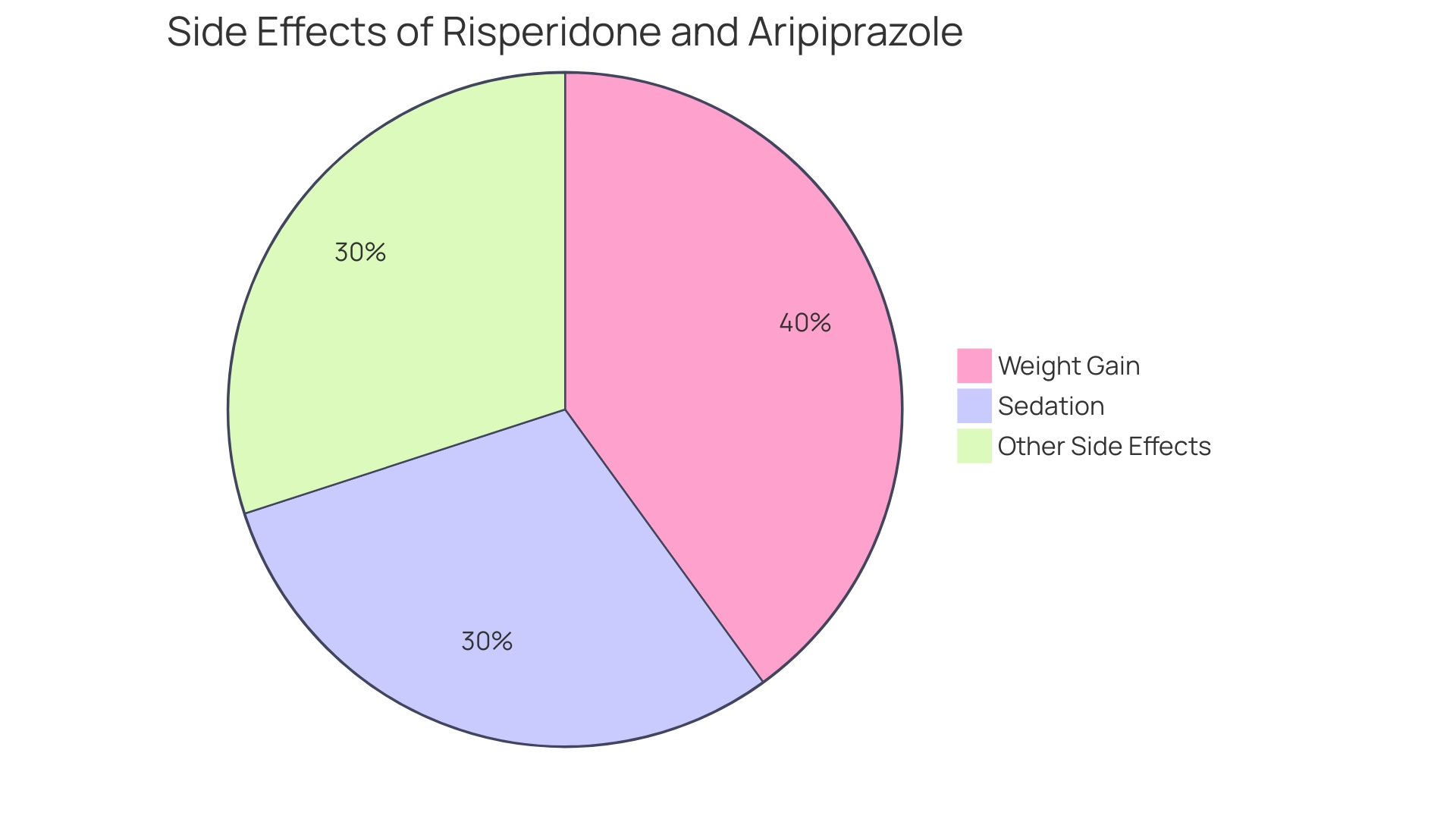
Other Medications Used in ASD Management
Beyond FDA-approved alternatives, other treatments can be effective in managing specific symptoms in children with ASD. 'Selective serotonin reuptake inhibitors (SSRIs) are frequently recommended to tackle anxiety, while attention-deficit/hyperactivity disorder (ADHD) treatments assist with focus-related challenges.'. Research shows that stimulants, commonly used for ADHD, increase levels of brain chemicals involved in thinking and attention, making them highly effective. However, they must be carefully prescribed and monitored due to potential side effects and interactions with other medications for conditions like diabetes, anxiety, and depression.
Dr. David R. Offord, a renowned psychiatrist for young people, emphasized the importance of recognizing both the unmet needs and strengths of youngsters, including those with disabilities, to ensure their well-supported participation in daily activities. This holistic approach is crucial for improving mental health and achieving equity. The Autism Community in Action (TACA) emphasizes the importance of comprehending and choosing effective treatments for individuals on the spectrum, highlighting the role of healthcare providers and guardians in creating customized care plans. By partnering with healthcare professionals, guardians can explore these medication choices to enhance the well-being and development of their offspring.
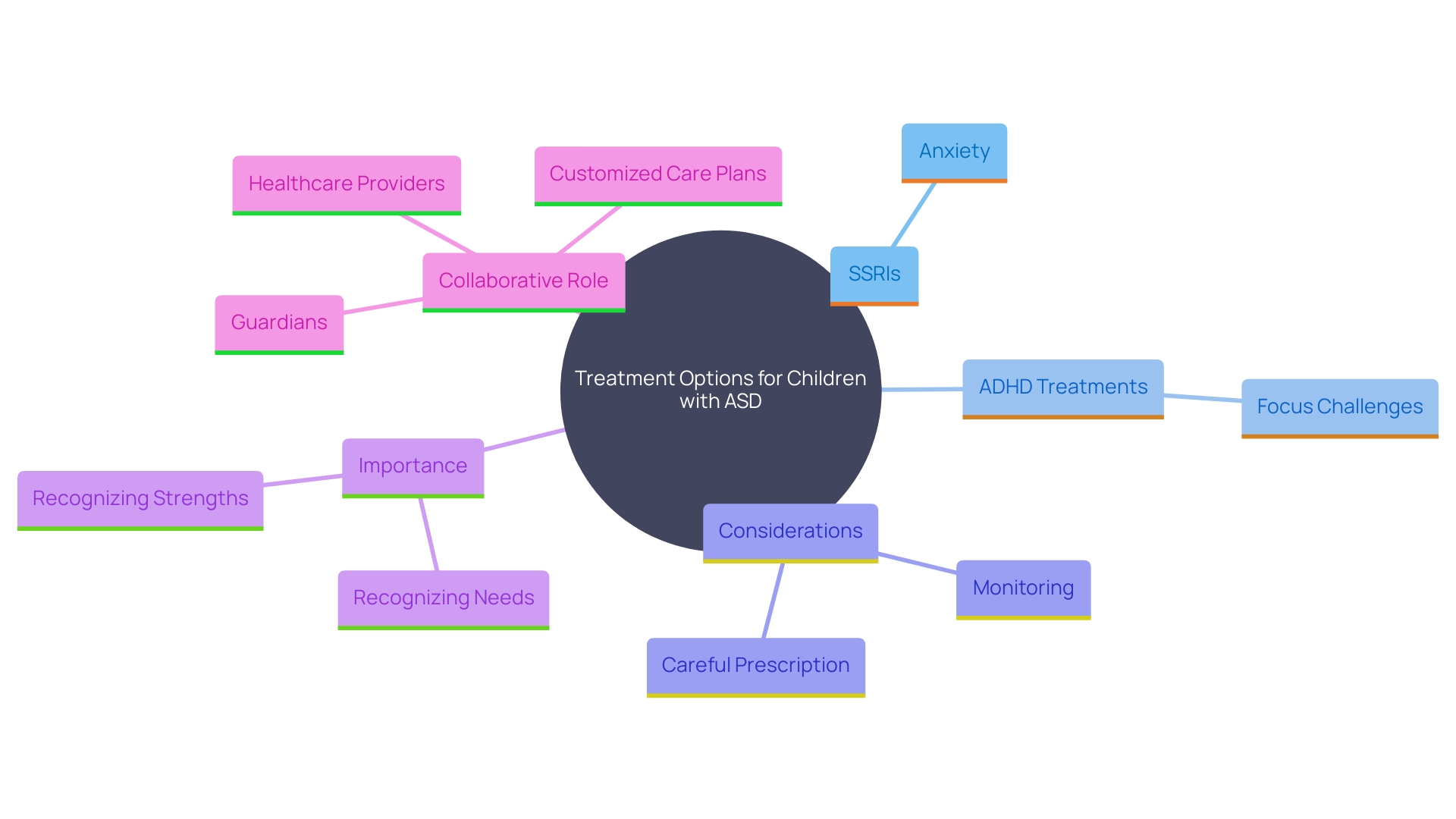
Complementary Alternative Medicine: Melatonin for Sleep Disturbances
Children with autism spectrum disorder (ASD) often face significant sleep disturbances, which can greatly affect their overall well-being. Melatonin, a hormone naturally produced in the brain to regulate sleep-wake cycles, is commonly used to help improve sleep quality. When it gets dark, the body produces more melatonin to signal that it's time to sleep. Nevertheless, individuals with ASD may still have difficulty falling or remaining asleep, leading many caregivers to seek melatonin supplements.
Research from JAMA Pediatrics highlights that melatonin has become one of the most popular supplements among parents in the U.S. In recent years, its use has surged, with nearly 6% of preschoolers, 18.5% of individuals aged 5 to 9, and 19.4% of preteens aged 10 to 13 having used melatonin in the past month. Though melatonin supplements can be purchased over-the-counter, it's important to note that they are not as tightly regulated by the FDA as medications, which means the actual dosage can vary from what is labeled.
Courtney Stinson, a mother from Milan, MI, found melatonin particularly helpful for her 9-year-old daughter, who has congenital myopathy and requires constant care. After consulting a pediatrician, she administered a low dose of melatonin and observed notable improvements in her daughter's ability to wind down, especially during times of mental restlessness.
Despite its benefits, melatonin should be used cautiously. Pediatric critical care physician Jenna Wheeler cautions that melatonin is frequently marketed in attractive shapes such as gummies, which can present a danger if youngsters reach them without supervision. Parents should always discuss melatonin use with healthcare providers to ensure it meets their specific needs and is used safely.
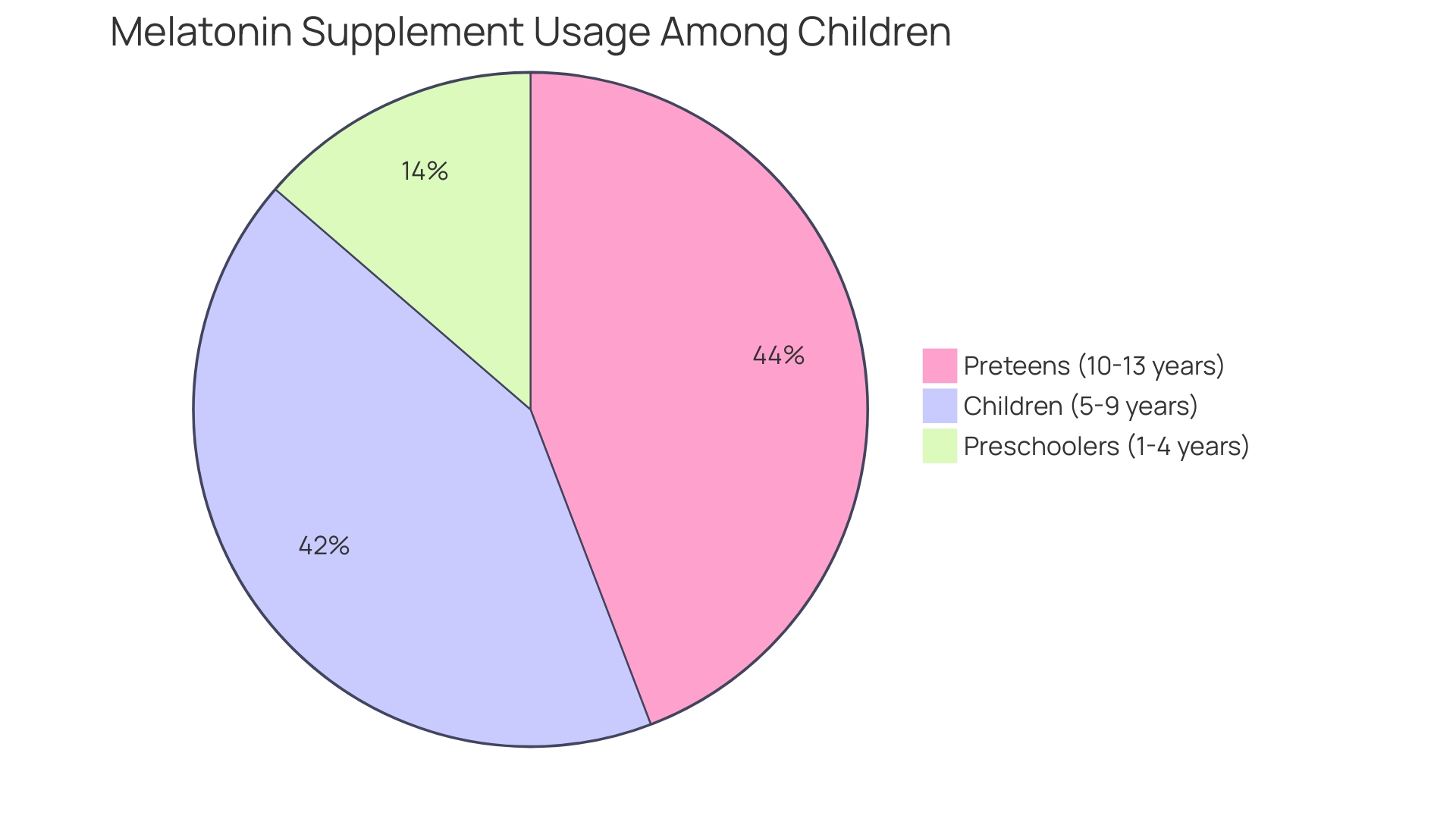
Challenges in Autism Medication Management
Overseeing treatments for youngsters with ASD can pose distinctive difficulties. Most pharmaceuticals are developed and approved for adults, leaving guardians and healthcare providers seeking solutions tailored to younger populations. For example, Mark Turner, a pediatric specialist with over 30 years of experience, has frequently encountered the challenge of informing parents that there are limited treatment options specifically designed for children.
Parents may encounter issues such as finding the right dosage, dealing with side effects, or ensuring consistent administration. A study by The Center for Discovery highlights that using AI and machine learning to analyze complex data sets can help predict and mitigate significant behavioral issues, which can indirectly assist in customizing treatment plans more effectively.
Theresa Hamlin, Ed.D., emphasizes the importance of such advancements, stating, 'If we can predict a behavior, then we can work on mitigating or preventing the impact of that behavior on the individual and on others. That’s huge.' This highlights the potential of technology in supporting medication management for ASD.
Locating a skilled and knowledgeable physician can make a substantial impact on a young person's health and future. Effective communication and a collaborative approach between parents and healthcare professionals are essential. Understanding these hurdles and leveraging available resources are the first steps in developing effective strategies to navigate them with confidence.
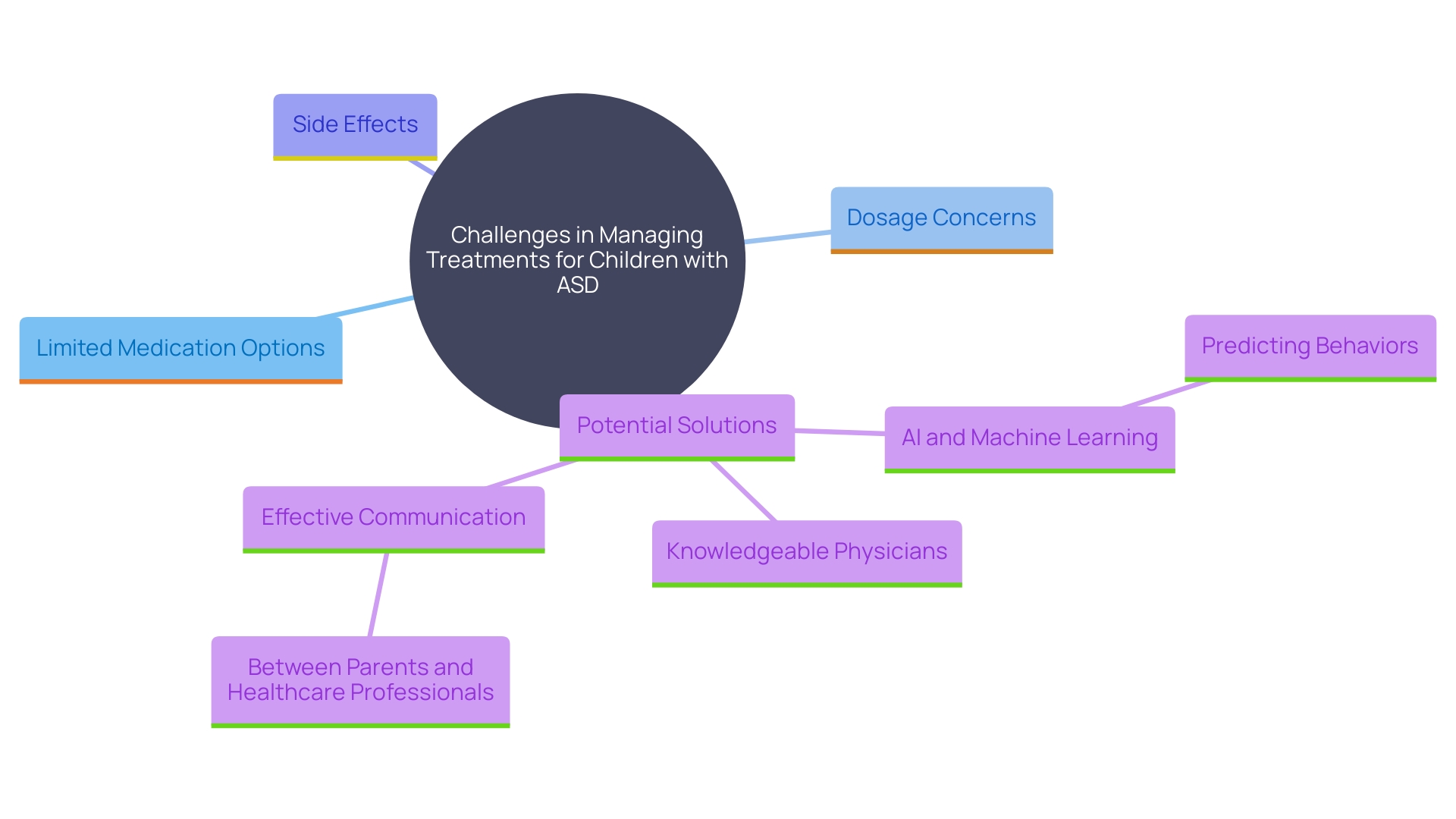
Importance of Collaboration with Healthcare Providers
Effective communication and collaboration with healthcare providers are fundamental when considering medication for a young person with Autism Spectrum Disorder (ASD). Parents should feel empowered to ask questions, express concerns, and actively participate in treatment decisions. As stated by Dr. David (Dan) R. Offord, a distinguished psychiatrist specializing in youth, making certain that children with disabilities obtain the assistance they require is essential for their mental health and overall wellness. Engaging with healthcare providers helps create a comprehensive care plan that addresses the child's unique needs and leverages their strengths.
Establishing a solid collaboration with healthcare providers can greatly enhance the management of developmental disorders and result in improved results. The Interagency Autism Coordinating Committee (IACC), a federal advisory committee, stresses the significance of collaboration and dialogue among different stakeholders, including caregivers, to improve autism research and services. 'Engaged and well-supported involvement of young individuals in their daily lives, be it at school, home, or leisure activities, is essential for their development and mental health.'.
The introduction of services like Summer Health, which offers caregivers access to reliable pediatric care via text message, highlights the importance of maintaining continuous communication with healthcare providers. Although medical care does not end with the visit, detailed medical visit notes ensure that all aspects of the care plan are documented and followed up on, despite the administrative burden it places on providers.
By fostering open communication and collaboration, parents can ensure their children receive the best possible care, tailored to their specific needs, ultimately contributing to a fair and supportive environment for their development.
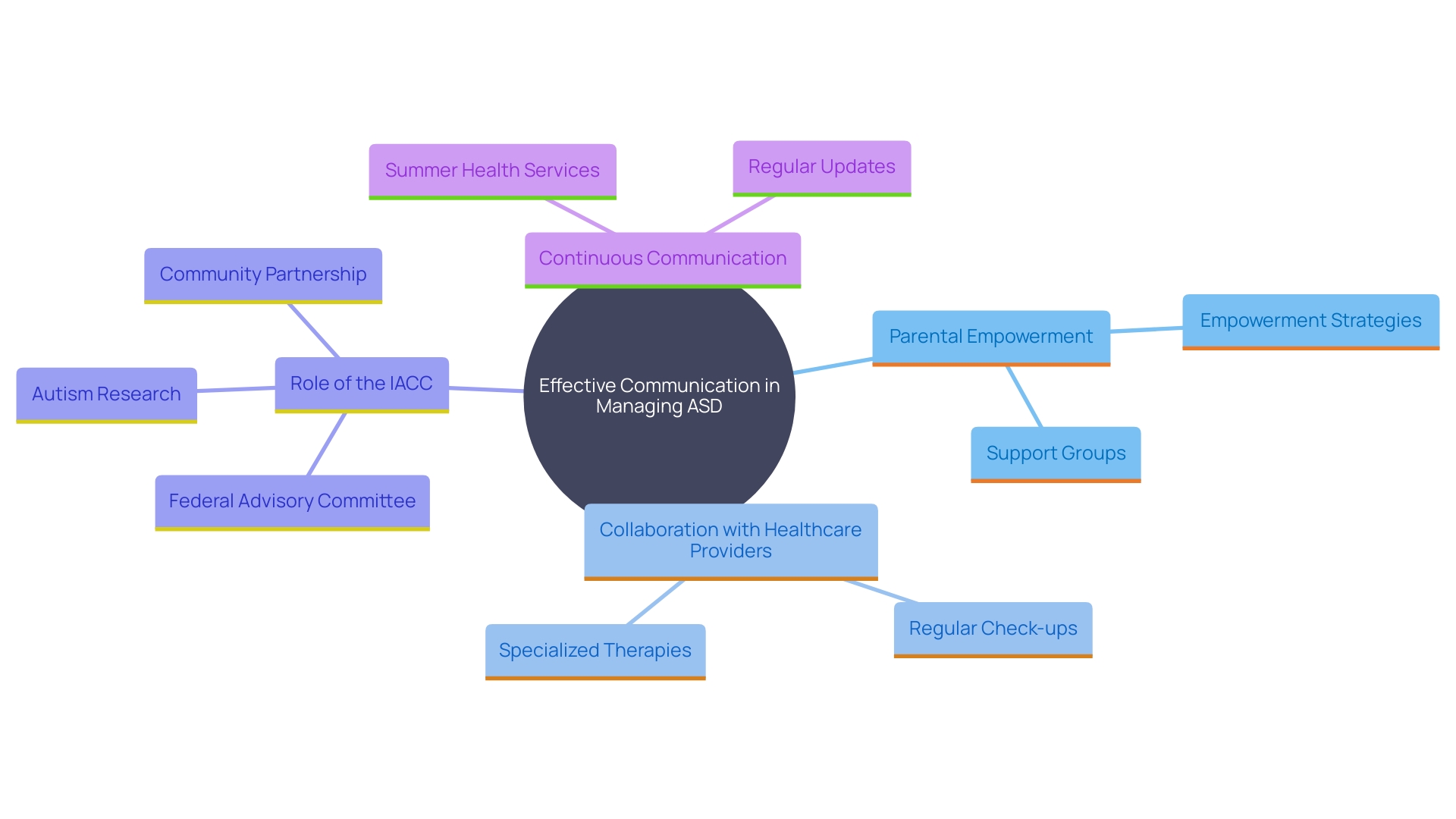
Future Prospects in ASD Treatment: Precision Medicine and Emerging Therapies
The future of ASD treatment holds great promise, with advancements in precision medicine and emerging therapies offering new hope. Researchers like Molecular Pharmacology and Neuroscience Assistant Professor Rocco Gogliotti are leading the way by integrating genomics, pharmacology, neuroscience, and human biomaterial into the drug discovery process. This innovative approach not only aims to develop targeted therapeutics but also helps to understand the origins of neurodevelopmental disorders, potentially leading to more effective treatments.
The Interagency Autism Coordinating Committee (IACC), a federal advisory committee, plays a crucial role in accelerating progress in research and services related to developmental disorders. By enhancing coordination and communication among federal agencies and collaborating with the community focused on developmental disorders, the IACC promotes a cooperative atmosphere for innovation. 'This collaboration includes various stakeholders, such as individuals on the spectrum, guardians, researchers, and advocates, ensuring that the voices of those directly impacted by the condition are heard and considered.'.
Moreover, organizations like The Autism Community in Action (TACA) highlight the importance of early and accurate diagnosis. 'With initiatives covering more than 41 states and assisting around 1,500 families each month, TACA highlights that early intervention, like behavioral therapy, results in improved outcomes for individuals on the spectrum.'. NeuroQure's mission to provide timely and accurate diagnostic tools further addresses the critical gap in existing technologies, offering families hope for a quicker and less painful diagnostic journey.
As these advancements unfold, parents are empowered to seek innovative solutions that cater to their child's unique needs, paving the way for more personalized care and support. The integration of cutting-edge research and collaborative efforts promises a brighter future for individuals with autism and their families.
Conclusion
Navigating the complexities of Autism Spectrum Disorder (ASD) requires a multifaceted understanding of its symptoms and treatment options. Recognizing the unique challenges faced by children with ASD is crucial for parents and caregivers. By being informed about various therapies, including medication and behavioral interventions, they can make empowered decisions that enhance their child's quality of life.
The importance of early intervention and the role of organizations like TACA in providing resources and support cannot be overstated.
Medications such as risperidone and aripiprazole have shown efficacy in managing specific symptoms associated with ASD, particularly irritability and aggression. While these medications can be beneficial, it is essential for parents to remain vigilant about potential side effects and engage in ongoing dialogue with healthcare providers. The landscape of ASD treatment is continually evolving, with emerging therapies and precision medicine promising a more tailored approach to care.
Effective communication and collaboration with healthcare professionals are foundational to successful medication management and overall child welfare. Parents should feel empowered to advocate for their children, ensuring that treatment plans are customized to meet their unique needs. As advancements in research and technology continue to emerge, the future looks hopeful for those affected by ASD, paving the way for innovative solutions and improved outcomes.




